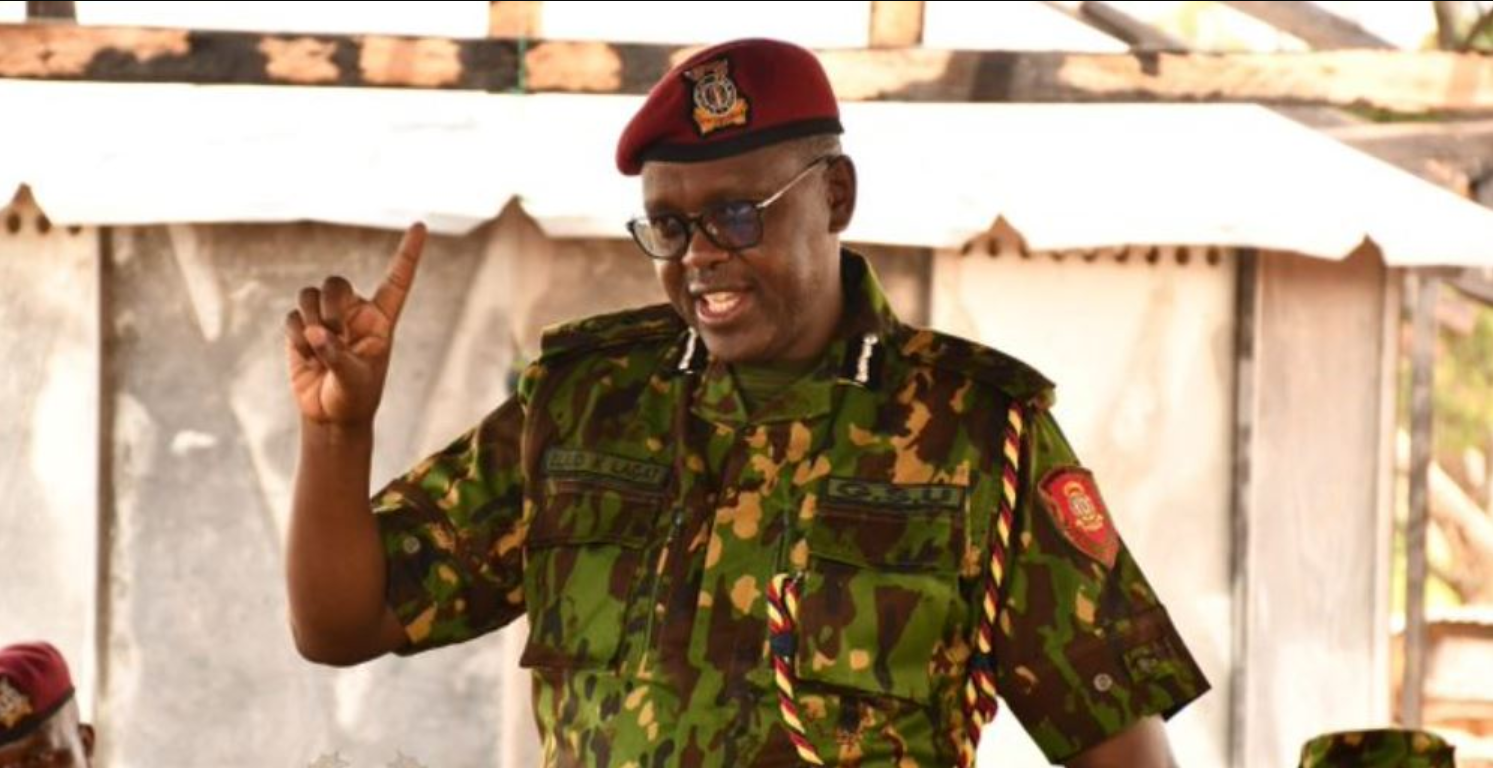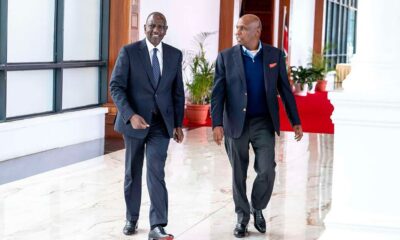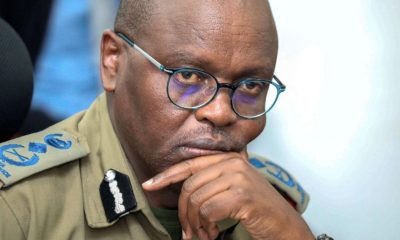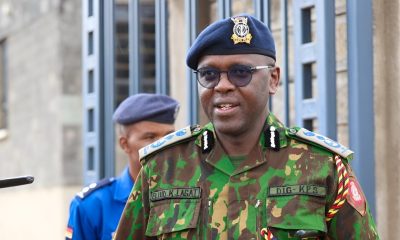Opinion
How Deep is DIG Lagat in The Kenyan Deep State?
Sources indicate that he has been operating as a de facto police chief, making key decisions on deployments, promotions, and transfers.

A Political Analysis of Power, Succession, and the Albert Ojwang Case
The death of 31-year-old teacher and blogger Albert Ojwang in police custody has exposed more than just alleged police brutality—it has revealed the intricate web of political maneuvering, succession battles, and power consolidation that defines Kenya’s security apparatus under President William Ruto’s administration.
At the center of this storm stands Deputy Inspector General Eliud Lagat, who on June 16, 2025, stepped aside from his position amid mounting pressure over Ojwang’s death.
But the question remains: Is Lagat merely a scapegoat in a larger political game, or is he indeed the architect of a systematic consolidation of power that extends deep into what critics call Kenya’s “deep state”?
The Ojwang Case: A Catalyst for Deeper Questions
Albert Ojwang was arrested on June 6, 2025, in Homa Bay following a defamation complaint filed by Lagat himself.
The blogger had allegedly published claims suggesting Lagat was under investigation by the Ethics and Anti-Corruption Commission.
Within hours of being transferred 350 kilometers to Nairobi’s Central Police Station, Ojwang was dead.
The initial police claim that he died by suicide after hitting his head on a wall was quickly debunked.
An independent autopsy revealed blunt force trauma to the head, neck compression, and multiple soft tissue injuries—evidence consistent with a violent assault.
This contradicted the police version of events and sparked nationwide protests.
The timing and circumstances of Ojwang’s death have raised uncomfortable questions about the extent of Lagat’s influence within Kenya’s security establishment and his relationship with the presidency.
The Succession Theory: Positioning for Power
Multiple sources within government and security circles suggest that Lagat’s current troubles stem not just from the Ojwang case, but from his positioning as the heir apparent to Inspector General Douglas Kanja.
This succession plan, allegedly orchestrated from State House, has created powerful enemies within the system.
The mathematics of police leadership succession reveal the political calculations at play. Kanja, appointed in September 2024 at age 60, was already at the traditional retirement age for public servants.
With the 2027 general election approaching, President Ruto reportedly needs a loyal ally at the helm of the police force—someone who can guarantee security during what promises to be a contentious electoral period.
This is where Lagat’s alleged deep state connections become relevant.
Sources indicate that he has been operating as a de facto police chief, making key decisions on deployments, promotions, and transfers.
His influence allegedly extends to personally selecting Officer Commanding Police Stations, with a notable preference for officers from the Kalenjin community—Ruto’s ethnic group.
The Gachagua Factor: Political Warfare
The role of former Deputy President Rigathi Gachagua in the anti-Lagat campaign cannot be ignored.
Gachagua’s recent claims that Lagat heads a “killer squad” of 101 police officers responsible for abductions and torture of government critics have added a political dimension to what might otherwise be seen as a straightforward police brutality case.
Gachagua’s accusations—including claims that Lagat personally operates key police stations like Kamukunji and Central—suggest a power struggle that goes beyond justice for Ojwang.
The former deputy president’s revelation that Lagat had been behind the systematic transfer and demotion of Kikuyu police officers in favor of Kalenjin appointees points to ethnic considerations in security sector appointments.
This ethnic dimension raises questions about whether the attacks on Lagat are motivated by genuine concerns about police brutality or by political calculations ahead of the 2027 elections.
The Deep State Architecture
Lagat’s alleged deep state connections manifest in several ways:
Direct State House Access : Sources confirm that Lagat reports directly to State House, briefing either President Ruto, Head of Public Service Felix Koskei, Private Secretary Farouk Kibet, or Interior CS Kipchumba Murkomen—all Kalenjin officials. This direct line of communication bypasses traditional command structures and suggests extraordinary influence.
Operational Control : Allegations that Lagat has been the power behind key police operations, including the suppression of Gen Z protests in 2024 and various opposition activities, indicate his role extends beyond his official deputy position.
Strategic Positioning : His career trajectory from GSU Commandant—a unit known for its ruthless efficiency—to the number two position in the police service, with apparent State House backing for the top job, suggests careful cultivation of political relationships.
The Protection Paradox
The most intriguing aspect of the Lagat saga is how someone allegedly so deeply embedded in the system could find himself so exposed.
The initial protection from State House—reportedly blocking his resignation and insisting on due process—suggests his value to the administration.
However, his eventual decision to step aside on June 16, 2025, came after what sources describe as intense behind-the-scenes pressure.
The statement he released, citing “good and conscious thought” of his responsibilities, was notably different from earlier reports that he had been blocked from resigning.
This shift suggests that even deep state connections have limits when public pressure becomes unsustainable.
The nationwide protests, international attention, and parliamentary pressure appear to have forced a recalculation at the highest levels of government.
The Lagat case reveals several uncomfortable truths about Kenya’s governance structure:
Personalization of Security : The allegations suggest that key security decisions are made based more on personal and ethnic loyalty than institutional processes. This undermines the rule of law and professional governance.
The timing of events—with the 2027 elections approaching—indicates that control of the security apparatus is seen as crucial for electoral success, raising questions about democratic governance.
Deep State Reality : Whether or not Lagat is guilty of the specific charges against him, his case confirms the existence of parallel power structures that operate outside normal constitutional frameworks.
The Questions That Remain
As investigations continue, several critical questions demand answers:
How deep does Lagat’s influence actually extend within the security apparatus? Are the allegations against him part of genuine accountability efforts or political warfare? What does his case reveal about the militarization of political competition in Kenya?
Most importantly, will the Ojwang case lead to meaningful police reform, or will it simply result in the replacement of one politically connected officer with another?
The answers to these questions will determine whether Kenya’s democracy can survive the deep state tendencies that appear to have taken root in its security establishment.
The case of DIG Eliud Lagat and the death of Albert Ojwang represents more than just another instance of police brutality in Kenya.
It exposes the intersection of personal ambition, ethnic politics, and institutional capture that defines much of Kenya’s current governance structure.
Whether Lagat is ultimately found culpable in Ojwang’s death, his case has already revealed the extent to which Kenya’s security apparatus has been personalized and politicized.
The fact that a deputy police chief could allegedly operate parallel command structures, make key appointments based on ethnic considerations, and maintain direct access to the presidency while being linked to serious human rights violations suggests a system in crisis.
The real question is not how deep Lagat is in the deep state—it’s how deep the deep state has penetrated Kenya’s democratic institutions.
The answer to that question will determine whether Kenya can maintain its democratic trajectory or will slide further into authoritarian governance disguised as democracy.
As Lagat steps aside and investigations continue, Kenyans must demand not just justice for Albert Ojwang, but a fundamental restructuring of the relationships between political power and security institutions. Only then can the country hope to break free from the deep state dynamics that threaten its democratic future.
This analysis is based on publicly available information and multiple source reporting. The ongoing investigations by IPOA and other agencies will ultimately determine the facts of the case.
Kenya Insights allows guest blogging, if you want to be published on Kenya’s most authoritative and accurate blog, have an expose, news TIPS, story angles, human interest stories, drop us an email on [email protected] or via Telegram
-

 Investigations1 week ago
Investigations1 week agoBillions Stolen, Millions Laundered: How Minnesota’s COVID Fraud Exposed Cracks in Somali Remittance Networks
-

 News1 week ago
News1 week agoUS Moves to Seize Luxury Kenya Properties in Sh39 Billion Covid Fraud Scandal
-

 Investigations1 week ago
Investigations1 week agoJulius Mwale Throws Contractor Under the Bus in Court Amid Mounting Pressure From Indebted Partners
-

 News1 week ago
News1 week agoMAINGA CLINGS TO POWER: Kenya Railways Boss Defies Tenure Expiry Amid Corruption Storm and Court Battles
-

 Americas1 week ago
Americas1 week agoUS Govt Audits Cases Of Somali US Citizens For Potential Denaturalization
-

 Business2 days ago
Business2 days agoEastleigh Businessman Accused of Sh296 Million Theft, Money Laundering Scandal
-

 Business2 days ago
Business2 days agoEXPLOSIVE: BBS Mall Owner Wants Gachagua Reprimanded After Linking Him To Money Laundering, Minnesota Fraud
-

 Politics2 days ago
Politics2 days agoHow Ruto-Moi Deal Died After Temporary State House Ceasefire





























